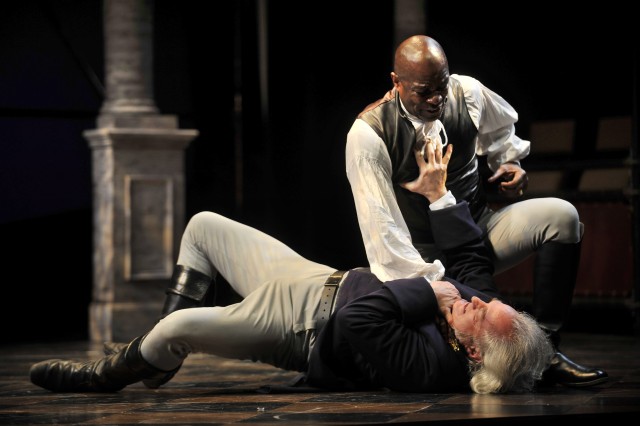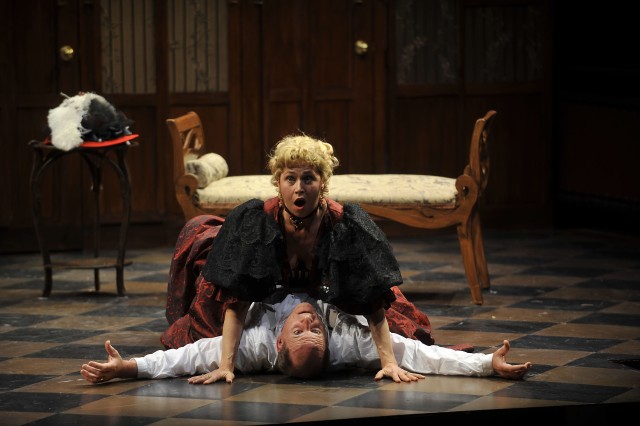Today’s entire Wall Street Journal drama column is devoted to Shakespeare & Company in Lenox, Massachusetts. Here’s an excerpt.
* * *
 Part of what makes Shakespeare Shakespeare is that his plays are so rarely all of a piece. Even the most raucously funny of his comedies are shot through with sweetness, just as his tragedies usually make room for laughter–sometimes macabre, sometimes nervous, sometimes just plain silly. Not all directors are alert to the comic aspect of Shakespeare’s tragedies, though, which is one of the many reasons why I was so impressed by Shakespeare & Company’s first attempt at “Othello.” Staged by Tony Simotes, one of the company’s founding members, this “Othello” is lean, clean, detailed but unfussy and fast on its feet. Mr. Simotes’ actors wisely play many of their lines for laughs, thus making it all the more horrifying when the curtain falls on a stageful of corpses.
Part of what makes Shakespeare Shakespeare is that his plays are so rarely all of a piece. Even the most raucously funny of his comedies are shot through with sweetness, just as his tragedies usually make room for laughter–sometimes macabre, sometimes nervous, sometimes just plain silly. Not all directors are alert to the comic aspect of Shakespeare’s tragedies, though, which is one of the many reasons why I was so impressed by Shakespeare & Company’s first attempt at “Othello.” Staged by Tony Simotes, one of the company’s founding members, this “Othello” is lean, clean, detailed but unfussy and fast on its feet. Mr. Simotes’ actors wisely play many of their lines for laughs, thus making it all the more horrifying when the curtain falls on a stageful of corpses.
The tone is set by the Iago of Michael Hammond, a deceptively affable soldier-bureaucrat who keeps his seething ambition on the tightest possible rein. Throughout the first part of the evening, he might well have wandered in from a production of “How to Succeed in Business Without Really Trying.” Only in his soliloquies does he give the audience a glimpse of the green-eyed monster hiding behind his mask of urbanity. No less deceptive is John Douglas Thompson’s Othello, who speaks Shakespeare’s verse with terrific dash and elegance (and the faintest of African accents, a nice touch). Mr. Thompson comes across as a poised, aristocratic Othello, the last man in the world whom you’d expect to end up strangling his naïve young wife in a mad fit of jealousy….
 Shakespeare & Company, which performs throughout the year on a lovely three-stage campus nestled in the foothills of the Berkshires, doesn’t limit itself to the classics. The last of the current season’s three mainstage offerings is “The Ladies Man,” a free English-language adaptation of Georges Feydeau’s “The Ladies Dressmaker” by Charles Morey, who also created the excellent stage version of “The Count of Monte Cristo” produced last month by the Alabama Shakespeare Festival. Mr. Morey has deliberately softened the edge of Feydeau’s hard-headed 1885 comedy of sexual manners, turning it into a friendly five-door farce in the good-humored American manner.
Shakespeare & Company, which performs throughout the year on a lovely three-stage campus nestled in the foothills of the Berkshires, doesn’t limit itself to the classics. The last of the current season’s three mainstage offerings is “The Ladies Man,” a free English-language adaptation of Georges Feydeau’s “The Ladies Dressmaker” by Charles Morey, who also created the excellent stage version of “The Count of Monte Cristo” produced last month by the Alabama Shakespeare Festival. Mr. Morey has deliberately softened the edge of Feydeau’s hard-headed 1885 comedy of sexual manners, turning it into a friendly five-door farce in the good-humored American manner.
Mr. Morey’s adaptation (which also borrows from Feydeau’s “A Flea in Her Ear”) starts off slowly and contains a few too many obviously jokey jokes: “Five hundred dressmakers in Paris and you had to pick this one–no wonder the French invented farce!” But the dramatic gears mesh as soon as the doors start slamming, and the result is a most effective vehicle for the talents of Kevin G. Coleman, Elizabeth Aspenlieder and Jonathan Croy, the director and stars of the brilliant production of Tom Stoppard’s “Rough Crossing” that Shakespeare & Company put on last summer. Mr. Coleman screws the comic tension up to an excitingly shrill pitch in the second act, then discharges it in an explosion of inspired craziness….
* * *
Read the whole thing here, including my equally favorable remarks on Tina Packer’s staging of All’s Well That End’s Well.
Terry Teachout on the arts in New York City
